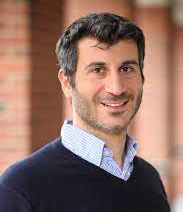CAREER: Energy Management for Smart Residential Environments Through Human-in-the-Loop Algorithm Design
Bio: 
Simone Silvestri is currently an Associate Professor in the Department of Computer Science of the University of Kentucky. Before joining UK, Dr. Silvestri was an Assistant Professor at the Missouri University of Science and Technology. He also worked as a Post-Doctoral Research Associate in the Department of Computer Science and Engineering at Pennsylvania State University. He received his Ph.D. in Computer Science in 2010 from the Department of Computer Science of the Sapienza University of Rome, Italy. Dr. Silvestri's research is funded by several national and international agencies such as NIFA, NATO and the NSF, and he received the NSF CAREER award in 2020. He published more than 80 papers in international journals and conferences including IEEE Transactions on Mobile Computing, IEEE Transactions on Smart Grids, ACM Transactions on Sensor Networks, IEEE INFOCOM, and IEEE ICDCS. He served in the organizing committee of several international conferences including as General Co-Chair of IEEE ICNP, Technical Program Co-Chair of IEEE SECON, IEEE SmartComp, and IEEE DCOSS. He also served in the Technical Program Committee of more than 100 conferences, including IEEE INFOCOM, IEEE ICNP, IEEE SECON and IEEE GLOBECOM.
Abstract:
While substantial progress has been made in the control of electric grid considering the cyber and physical characteristics, there has been a gap in the integration of smart grid research as it integrates with human behavior -- especially in interactions with energy management systems. For example residential energy consumption has been rapidly increasing during the last decades, especially in the U.S. where 2.6 trillion kilowatt-hours were consumed during 2015, and an additional 13.5% increase is expected by 2040 . Research efforts such as demand response have been made to reduce this consumption especially in smart residential environments. Concepts such as demand response have largely overlooked the complexity of human behaviors and perceptions, and recent research in the social-science domain and recent experience has challenged the effectiveness of this approach and in some instances led to an abandonment and avoidance of such concepts. The objective of this proposal is to overcome the limitations associated with state-of-the-art energy management systems by designing novel algorithms, machine learning models, and optimization techniques that specifically consider user behaviors, perceptions, and psychological processes. This revolutionary approach will unleash the full potential of smart residential environments in reducing residential energy consumption and has the potential to transform the way in which energy management systems are designed, implemented, and used by people. This project also supports innovative educational activities such as classes, real time demonstrations, coding challenges, and research experiences for high school students. The PI will also lead a cohort of students to the diversity-oriented Grace Hopper conference and teach seminars for Hispanic elementary students. Finally, a new class on Cyber-Physical-Human System will be designed and several graduate and undergraduate students will participate in the research activities.
The proposed research combines novel algorithmic, machine learning, and optimization solutions that consider previously un-examined human behaviors, perceptions, and psychological processes. Specifically, in order to enable fine grained energy monitoring, we propose novel stream-based appliance recognition algorithms for smart outlets. These algorithms learn the appliance consumption signatures and the user engagement with the system to optimize the learning process. In addition, energy saving optimization strategies are designed by considering the user perception through social-behavioral well-being models. These models learned and refined through novel machine learning algorithms based on regressograms, interpolation, and regression using user feedback provided through a smartphone. In addition, we develop optimization algorithms for energy exchange in the context of smart residential environments equipped with renewable energy generation. These algorithms match the users' demand and production, by considering and learning also their availability and preferences in the energy exchange process. The proposed research is validated through real testbeds and large-scale simulations based on real traces.